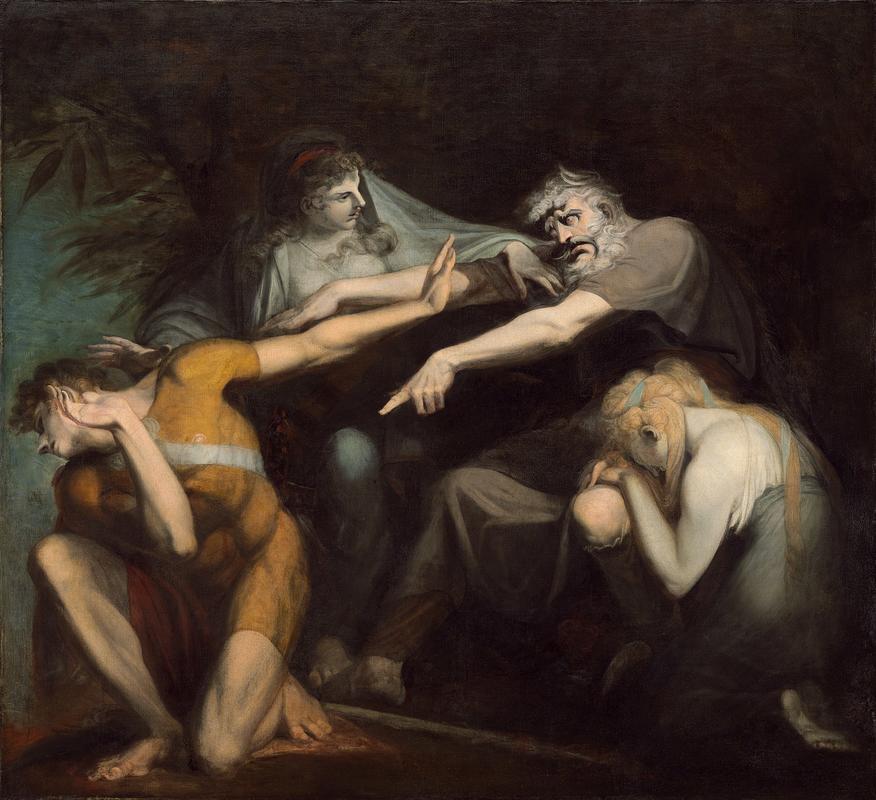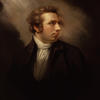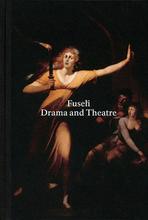More about Oedipus Cursing His Son Polynices
- All
- Info
- Shop

Contributor
At some point, disagreeing over test scores, grades, politics or athletic skills, many dads today curse at our sons, but the curse of Oedipus in Oedipus Cursing His Son, Polynices by Fuseli is a real, ancient, serious curse, not a four-letter word.
According to the ancient oral stories of many traditions, words, names, and sometimes even numbers have a sacred potency which determines the destiny of people. The entire life of Oedipus was determined by the words of the Oracle of Apollo at Delphi, who predicted that he would kill his father and marry his mother. Fuseli's painting shows Oedipus, who has blinded himself and wandered away to escape the tyrant Creon, cursing Polynices, with his daughters miserably looking on. It was a double curse, that Polynices and his brother would kill each other in battle, which they did. Talk about a family feud!
Originally, the Swiss artist Fuseli was ordained as a Zwinglian Reformed Church minister, but artist Joshua Reynolds saw that his art skills were really cookin', and encouraged him to become a painter. Five years later, Reynolds gave him another pro tip: go to Rome, young man, and study that stuff to make your mark on the art world. Rome influenced Fuseli enormously, as it has done for so many artists. Fuseli's research of Roman gestures and the Roman interest in horror, betrayal, and tragedy influenced Oedipus Cursing His Son, Polynices when he created it over a decade later. In those days there was a debate as to whether the Greeks or Romans had the best-tasting moral juice to nurture the ideas of young artists: Fuseli's father's friend, Johann Joachim Winckelmann, taught that Greek art was superior to all other art, and that Michelangelo was an upstart, a reprobate, and a hooligan. Winckelmann was "Father Knows Best" and Michelangelo was Rock 'N Roll: there was no way Fuseli could pass up an opportunity to channel the Romans. Parents just don't understand.
Sources
- Andres, Sophia. "Narrative Challenges to Visual, Gendered Boundaries: Mary Shelley and Henry Fuseli." Journal of Narrative Theory: JNT. 31, no. 3. Ypsilanti, MI: Eastern Michigan University, 2001.
- Barasch, Moshe. Modern Theories of Art: From Winckelmann to Baudelaire, Volume 1. New York: NYU Press, 1990.
- Cale, Luisa. Fuseli's Milton Gallery: 'Turning Readers Into Spectators'. Oxford: Clarendon, 2006.
- Füssli, Johann Heinrich. The life and writings of Henry Fuseli, the former written and the latter ed. by J. Knowles, Volume 1. London: Colburn & Bentley, 1831.
- Orgel, Stephen. The Authentic Shakespeare, and Other Problems of the Early Modern Stage. London: Psychology Press, 2002.
- Sophocles. Œdipus at Colonus, and Antigone: Literally Translated ... According to the Text of Bruck; with Copious Notes. By George Downes. Dublin: P. Byrne, 1823.
- White, Fred. The Daily Writer: 365 Meditations To Cultivate A Productive And Meaningful Writing Life. London: Penguin, 2008.












